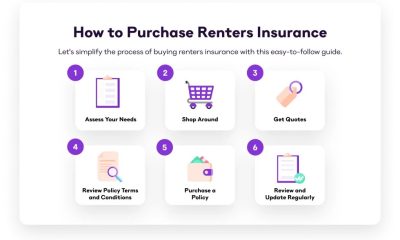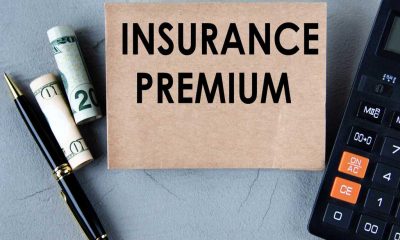Insurance
Types Of Business Insurance Plans You Need

Insurance can help you protect your organization from a wide range of threats. Some of the most popular forms of company insurance plans are:
- General liability insurance
- Commercial property insurance
- Business income insurance
- Professional liability insurance
- Workers’ compensation insurance
- Employment practices liability insurance
- Product liability insurance
- Commercial auto insurance
- Commercial umbrella insurance
- Cybersecurity insurance
Understanding how each type of business insurance (also referred to as commercial insurance) works can help you determine which coverage options you may need.
Types of Business Insurance
| Coverage Type | What Risks Does It Protect Against? | What Costs Does It Cover? | What Does It Cost? |
| General Liability | Lawsuits from people outside of your company, including consumers or vendors | Legal fees, settlement costs, and medical expenses for injured parties | $42/month |
| Commercial Property | Damage to business property | Repair or replacement costs of damaged property | $63/month |
| Business Income | Loss of income due to a business slowdown or suspension stemming from property damage | Lost income | $85/month |
| Professional Liability | Lawsuits relating to claims of negligence, errors, or malpractice | Legal fees and settlements | $61/month |
| Workers’ Compensation | On-the-job injuries | Medical bills and lost income for injured workers | $45/month |
| Employment Practices Liability | Lawsuits relating to unfair employment or hiring practices | Legal fees and settlements | $182/month |
| Product Liability | Injuries or bodily harm caused by defective products | Legal fees and settlements | $42/month (usually included in general liability premium) |
| Commercial Auto | Vehicles driven for business use | Repair costs, medical bills, legal fees, and settlements | $147/month |
| Commercial Umbrella | Lawsuit settlements that exceed coverage limits of other business insurance | Legal fees and settlements | $75/month |
| Cyber Liability | Cyber-hacking and data breaches | Varies; may include costs to restore data, enhance security, or settle liability lawsuits | $140/month |
The data above indicate the average monthly cost of several small company insurance policies, as reported by Insureon, an online marketplace for small business insurance. The real cost of insuring a small business may be lower or more, depending on your specific circumstances and requirements.
- General Liability Insurance
General liability insurance protects your company if it is sued. This form of coverage is fairly broad and can protect you against claims arising from a variety of events.
General liability insurance protects you from claims made by anyone outside of your organization, such as suppliers or customers. This sort of coverage can cover the costs of a litigation, including settlements made to claimants and medical bills associated with personal injury cases.
- Commercial Property Insurance
Commercial property insurance protects your business’s property from a wide range of losses. For example, if your property is damaged due to a natural disaster or civil upheaval, your policy may cover the cost of repairing or replacing affected assets.3. US Small Business Administration. “Get Business Insurance: Six Common Types of Business Insurance.”
A civil authority provision covers business closures caused by government actions following a disaster or life-threatening incident. Commercial property insurance covers damage caused by fire, smoke, wind, hail, civil disobedience, and vandalism.
- Business Income Insurance
Business income insurance is a type of coverage intended to augment business property insurance. This type of protection protects you if your business income is disrupted due to property damage.4
Business income insurance protects you against income loss caused by a slowdown or cessation of operations due to property damage. This type of coverage helps to replace lost operational income.
- Professional Liability Insurance
Professional liability insurance provides coverage for losses caused by perceived faults made while performing your professional duties. You can get this form of insurance to cover any situations that are not covered by a general liability policy.
Professional liability insurance can provide protection against litigation resulting from negligence, malpractice, or errors. This sort of policy might provide benefits to cover lawsuit settlements and legal bills.
- Workers’ Compensation Insurance
Workers’ compensation insurance is a sort of liability coverage that covers your company if one of its employees becomes hurt on the job. State legislation might specify which sorts of firms must have workers’ compensation coverage.
Workers’ compensation insurance is designed to cover workplace injuries. This type of policy can cover medical expenses for injured employees and offer income replacement until they can return to work.
- Employment Practices Liability Insurance
Employment practices liability insurance is designed to protect your company from lawsuits arising from claims of unlawful recruiting or employment practices. If you are sued, your coverage may cover legal bills or settlements with plaintiffs. 6IRMI (International Risk Management Institute): “Employment Practices Liability Insurance (EPLI).”
Employment practices liability insurance can cover a variety of situations, including litigation including wrongful termination, discrimination, sexual harassment, and retaliation. This type of policy may cover legal bills and settlements.
- Product Liability Insurance
Product liability insurance covers enterprises that make or produce tangible goods. This coverage protects against claims for defective items that cause injury or physical harm.3
Product liability insurance protects your company from lawsuits resulting from a defective product that has caused injury, physical harm, or death. This type of policy may cover legal bills and settlements.
- Commercial Auto Insurance
Commercial auto insurance works similarly to personal auto insurance, except it is intended to protect company vehicles. The type of coverage and coverage limitations required vary by state.
Commercial auto insurance covers you against damage caused by accidents, vandalism, or theft of work vehicles. This type of policy can pay for repairs, medical expenses, legal fees, and settlements.
- Commercial Umbrella Insurance
Commercial umbrella insurance is intended to cover risks that are not covered by other forms of business insurance. For example, if you are sued and have exhausted the coverage limits of your general liability policy, an umbrella policy may help to fill the gaps.8
Commercial umbrella insurance can assist you reduce financial losses caused by lawsuit settlements that exceed other business insurance coverage limitations. This type of policy includes legal fees and settlements.
- Cyber Liability Insurance
Cyber liability insurance, often known as cybersecurity insurance, is intended to cover liability and damage losses arising from the electronic transfer or sharing of data. This form of insurance is growing more vital as hackers and identity thieves target businesses online.
Cybersecurity insurance can help your company if electronic or digital data is lost or otherwise compromised. This sort of policy can cover the expense of upgrading or reinstating cybersecurity systems, as well as liability protection for lawsuits.
How to Choose the Right Business Insurance Plan
Choosing the correct business insurance is critical since you do not want to leave some elements of your company vulnerable or overpay for coverage. The appropriate questions might help you better assess your needs.
Some of the most critical questions to answer are:
- How many employees does the business have?
- Does the business have a physical location, or does it operate online only?
- Is there any business equipment that will need to be insured?
- What types of liability risks does the business face?
- Are there any vehicles that will need to be covered?
- What would happen if the business is interrupted by a natural disaster or another situation that’s beyond my control?
- Will I need insurance to cover special situations? For example, will it be necessary to buy key person insurance if I plan to sell or transfer the business to my heirs?
It’s also a good idea to consider other considerations while selecting insurance. For example, you’ll need to consider how much liability coverage is necessary and what kind of rates your company can afford.
Also, examine what types of coverage may be needed by state law or the industry in which you work. Financial services professionals, for example, may be obliged to have professional liability insurance.
If you’re ready to buy business insurance, you should know what to expect. The process is not that different from purchasing other types of insurance. Here is a step-by-step guide to buying business insurance.
- Assess Your Business Risk
Risk considerations for your business can influence which insurance you require. Imagine running an HVAC service shop. Eight of your 10 employees drive work vans to customers’ homes or businesses. Insuring those automobiles with a commercial auto coverage makes sense.
What if you manage your firm alone without employees? Using your own car for work and having personal car insurance may not require an auto coverage. Workers’ compensation may not be needed either. Looking at your business through the perspective of risk might help you decide what insurance to get and what to skip.
Understand What’s Covered
You should know the sorts of company insurance by now. Knowing two things helps when creating a policy:
- What’s covered
- What’s excluded
Do not be surprised if you need to file a claim and discover a coverage gap. An agent or broker can assist you find gaps in a business insurance coverage that could expose your company.
Compare Quotes for Business Insurance
- Many organizations offer company insurance at different prices. Business insurance rates and deductibles are the key cost factors. One quote is good, but being able to compare it helps. At least three business insurance quotes may help you determine your budget. Get rates for each policy you buy to cover various topics. Compare individual policy quotes against bundled business insurance rates to discover if bundling saves money.
When do I need business insurance?
- Business insurance is necessary if you fear financial losses from liability claims or other circumstances. If you’re sued for damages, you could lose a lot without insurance. If your state requires business insurance, you may need it.
Should I buy stand-alone policies or a bundled business insurance package?
- If you only require one or two business insurance kinds, stand-alone policies may make sense. For more comprehensive coverage, a business insurance package or bundle may be better. If you can get numerous policies at discounts, packaged insurance may be cheaper.
What types of business insurance would I need if I work from home?
- Working from home does not eliminate the requirement for business insurance. It may be prudent to have general liability insurance in place. You may also want to buy insurance to protect any business property you use while working from home if it is critical to your business operations.
The Bottom Line
Business insurance can be quite beneficial if you find yourself in a worst-case scenario and need to file a claim. Taking the time to compare the many types of company insurance might assist you in determining which policy(s) are most appropriate for your needs. Once you’ve determined your coverage requirements, you may proceed to compare rates from the best small business insurance companies.










